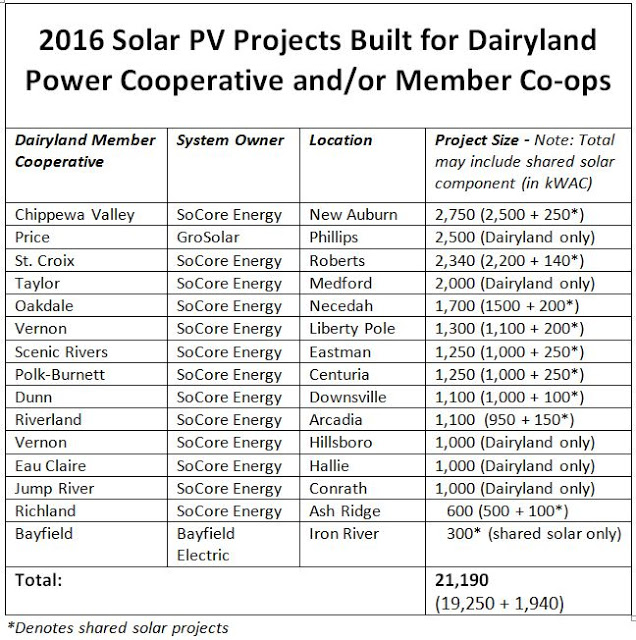
by jboullion | Jan 16, 2017 | Uncategorized
FOR IMMEDIATE RELEASE
January 16, 2017
More information
Tyler Huebner, Executive Director
608.255.4044 x 1
tyler.huebner@renewwisconsin.org
The biggest and best renewable electric installations in 2016 are set to be recognized at RENEW Wisconsin’s annual Renewable Energy Summit this Thursday, January 19th in Madison. The recognition ceremony will take place at 12:45 PM, during lunch. The Summit will be held at the Monona Terrace in Madison; registration starts at 8:00 AM and the program runs from 9:00 AM to 3:30 PM.
As strong a year as 2015 was for Wisconsin solar installers, 2016 shattered records for total capacity added, with several electric providers, led by La Crosse-based Dairyland Power Cooperative and many of its member cooperatives, generating most of the momentum. Between utility-scale projects on the one end to residential rooftop installations on the other, Wisconsin’s solar output will more than double the previous year’s totals.
Indeed, since last year’s Summit, construction started on more than 30 megawatts of solar panel installations, which will generate enough electricity to supply about 5,000 Wisconsin homes’ annual electricity usage.
The recognition will be bestowed across three categories:
Utility solar. In 2016 Dairyland Power Cooperative entered into contracts to purchase the output from 14 solar arrays under construction in Wisconsin, with a combined capacity of nearly 19 megawatts. On top of the capacity serving Dairyland, many member cooperatives agreed to additional panels to supply their shared solar programs. All told, Wisconsin’s electric cooperatives committed to more than 21 megawatts of solar last year.
Two Madison-based investor-owned utilities, Alliant Energy and Madison Gas & Electric, brought three arrays online in 2016. When it was energized, Alliant’s solar array in the Town of Beloit became the largest solar-powered generator in Wisconsin. Madison Gas & Electric’s shared solar project came about through an innovative partnership with the City of Middleton, whose rooftops now holds more than 600 kW of solar, as the City police station added an array in addition to the larger MG&E Shared Solar project.
Landmark and innovative initiatives. National corporations, state-based businesses, Wisconsin communities, and local activists continued their progress in embracing solar energy to advance public policy goals and/or enhance their business profile. In 2016, several noteworthy initiatives and collaborations were launched that married clean electricity productions with other objectives such as economic competitiveness, job training, and community-building.
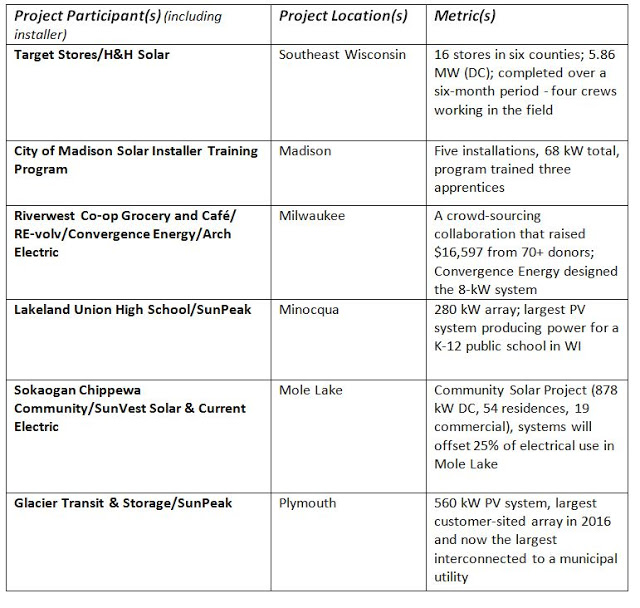
Residential solar group purchase programs. Cities and nonprofit organizations collaborated to launch four community-based solar group purchase programs, spanning from Eau Claire in the northwest to Racine in the southeast. Solar group purchase programs are designed to reduce the cost and complexity of installing solar panels on individual houses, while sharing the benefits of increased marketing and community involvement. By the end of 2016, these four programs resulted in 139 households committing to install more than 600 kW of solar on their properties, far outpacing previous years’ totals.
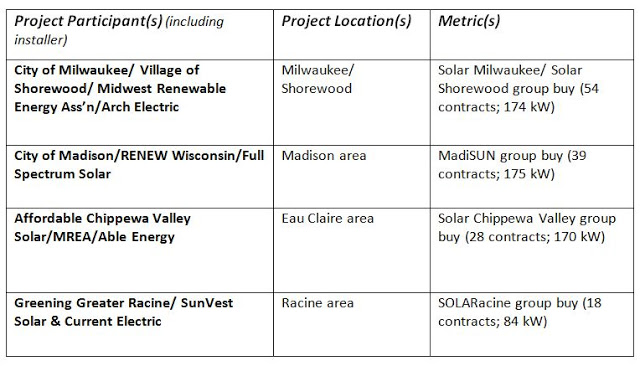
“Wisconsin solar energy saw its best year ever in 2016, with the projects installed and under construction more than doubling the state’s total production,” said Tyler Huebner, RENEW Wisconsin’s Executive Director. “But we can’t stop here, because our neighboring states are growing even faster than us. In 2017, we will also see the welcome development of wind energy and biogas investments come back to Wisconsin. Increasing our renewable energy investments and usage will help build a stronger, cleaner economy for Wisconsin.”
For more information on the 2017 Summit program agenda, speakers, and registration, please visit http://www.renewwisconsin.org/2017_Summit/.
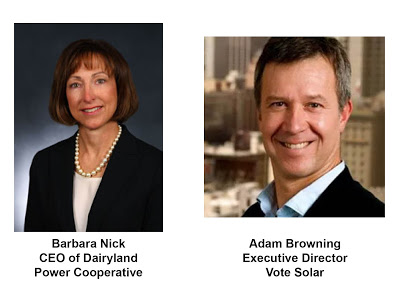
by jboullion | Dec 20, 2016 | Uncategorized
Event to Spotlight Mainstreaming of Clean Energy
Immediate release
December 20, 2016
More information
Tyler Huebner, Executive Director
608.255.4044 x 1
tyler.huebner@renewwisconsin.org
RENEW Wisconsin will host its sixth annual Renewable Energy Policy Summit on Thursday, January 19th, 2017, at Monona Terrace in Madison. The theme of the event, “Clean Energy Goes Mainstream,” will highlight the significant expansion of renewable power underway in Wisconsin, both at the customer and utility level.
This one-day event will feature two keynote speakers.
– Barbara Nick, CEO of La Crosse-based Dairyland Power Cooperative, which has entered into contracts to supply its member co-ops with renewable electricity from a
large wind power project in Lafayette County and 14 solar arrays across
western Wisconsin. Barb will explain why Dairyland decided to accelerate
its own clean energy transition and how its new sources of solar and
wind energy will benefit its member cooperatives.
– Adam Browning, Executive Director of Vote Solar, which is working to make solar power the go-to energy resource in all 50 states. As the afternoon keynote, Adam will highlight solar’s dramatic expansion in recent years, including its impact on the national economy and on local economies throughout the United States. He will also discuss the critical role that state policy will play in maintaining solar’s momentum.
Ms. Nick will kick off the summit program with her keynote address, followed by a panel session discussing the driving forces behind the clean energy transition and its broadening appeal among homeowners, businesses, and policymakers.
After lunch, RENEW will recognize the most noteworthy clean energy installations launched or energized this year in Wisconsin, as well as the individuals, organizations, and communities that made them happen.
Adam Browning will launch the afternoon program with his keynote, followed by an industry panel session examining the factors propelling the clean energy expansion, and identifying the mix of policies and practices for sustaining that expansion.
The program will feature networking opportunities with exhibitors and attendees, as well as a social hour following the close of the formal program.
RENEW Wisconsin’s Executive Director Tyler Huebner says, “We chose this year’s theme to highlight the acceleration of clean energy across corporate America, utilities, and everyday homeowners. Solar energy is poised to continue its growth in Wisconsin, while wind power and biogas appear on the verge of making comebacks. All these resources are cost-effective today, and can provide significant value to Wisconsin if deployed more aggressively.”
Summit registration is open and over 150 individuals have already signed up. Rates are $120 for Members of RENEW Wisconsin, $150 for non-members, $90 for government and non-profit employees, and $35 for students. Membership with RENEW starts at $35 for individuals and $200 for businesses and organizations.
For more information on the 2017 program agenda, speakers, and registration, please visit our website.
An impressive list of corporate and organizational sponsors has already signed on to support the event, which are showcased on the final page.
by jboullion | Nov 18, 2016 | Uncategorized
For Immediate Release – November 18, 2016
For More Information: Tyler Huebner, Executive Director, 608-255-4044 ext 1
(Madison, WI). In today’s open meeting, the Public Service Commission
sharply hiked the monthly “fixed charge” that Alliant Energy’s Wisconsin Power
& Light residential electricity customers will face by 95%, from $7.67 per
month up to $15 per month.
 |
| The Public Service Commission of Wisconsin building in Madison. |
The “fixed charge” is the base fee which all customers must
pay each month, no matter how much energy they use. Overall, Alliant’s residential customers will
see their monthly electricity bills increase by 4-5%.
By contrast, the fixed charge that Alliant’s Iowa customers
must pay every month remains at $10.50.
“Increasing the fixed charge will raise bills for customers
that use smaller amounts of electricity monthly, such as seniors,
apartment-dwellers, and energy-conscious customers including those who have
installed solar panels,” said Tyler Huebner, RENEW Wisconsin’s Executive
Director.
RENEW Wisconsin and a broad set of stakeholders have opposed
hikes in fixed charges since 2014,
when these requests first appeared.
“Wisconsin electricity customers now pay dramatically higher
fixed charges than their counterparts in other states,” said Tyler Huebner,
RENEW Wisconsin’s Executive Director.
“
Our testimony documented that the vast majority of state agencies
nationally are either rejecting these fixed charge hikes outright, or granting
much smaller increases, and only in Wisconsin are these fees being nearly
doubled.”
As documented by RENEW in testimony, the increase in fixed
charges granted to U.S. investor-owned utilities since 2014 has averaged about
14%. But for the five investor-owned
utilities in Wisconsin, the average fixed charge increase has been 83%.
-END-
RENEW Wisconsin leads and accelerates the transformation to
Wisconsin’s renewable energy future through advocacy, education, and
collaboration. More information on RENEW’s web site at www.renewwisconsin.org.
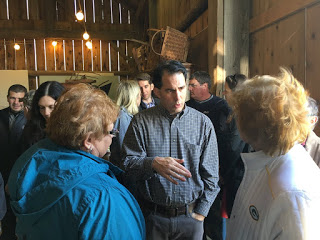
by jboullion | Nov 18, 2016 | Uncategorized
For immediate release
November 18, 2016
More information
Tyler Huebner, Executive Director
608.255.4044
tyler.huebner@renewwisconsin.org
 |
Governor Scott Walker at Heritage Farm in Kewaunee,
with RENEW’s Tyler Huebner in the background. |
Yesterday, RENEW Wisconsin was in the audience as Governor Scott Walker announced the State of Wisconsin’s intention to invest in biodigesters that will turn dairy
manure into renewable energy while assisting with improvements in water
quality.
Governor Walker announced that the Public Service Commission, Department of Natural Resources, and Department of Agriculture, Trade, and Consumer Protection are working together to deliver a Request for Proposals in January 2017. The request for proposals will allow private firms to submit bids to meet the goals and specifications set out by the agencies.
A major goal of the initiative is to aid with water quality problems in environmentally sensitive areas of the state, and the announcement was made in Kewaunee, one of those regions. Governor Walker indicated that this initiative is one of a series of steps, and not in and of itself the only solution, needed to aid water quality in Kewaunee County.
Wisconsin is the national leader in deploying biodigesters, also known as anaerobic digesters, on farms. We have 34 farms with digesters in Wisconsin. These systems turn cow manure into solids, liquids, and methane, which is an energy resource that is the primary component of what we commonly call “natural gas.”
In many of the digesters on farms in Wisconsin today, the methane is cleaned and passed through a generator to create electricity, which is sold to the local power company. Most of these digesters are located right on the premises of the dairy farms.
The system envisioned by the Governor’s announcement, according to a recent interim order from the Public Service Commission, might collect manure from farms of all sizes, and process it in a centralized biodigester. Instead of using the methane to create electricity, it could be further cleaned and then injected into the natural gas delivery system. Natural gas is used to heat homes and businesses as well as power industrial processes. (The PSC’s interim order can be found here, see pages 9 thru 11).
“Biodigesters present a win-win-win for renewable energy, the environment, and farmers. These systems are the ultimate recycle and reuse operation,” said Tyler Huebner, Executive Director of RENEW Wisconsin. “Moreover, Wisconsin is blessed with companies that know how to design, engineer, build, and operate these systems such as Chilton-based DVO, Inc., BIOFerm Energy Systems of Madison, Miron Construction of Neenah, Symbiont of West Allis, and Clean Fuel Partners of Madison.”
Digesters process manure in a way that can enable water quality improvement technologies to be added onto the system. Dane County has been investing in these systems over the past half-decade to accomplish similar water quality improvement goals, and their recently passed County Budget includes $18 million to inject methane collected at the landfill into the natural gas pipeline system, similar to what the state may be envisioning.
“Digesters can provide a lot of benefits when they are designed, engineered, and operated with proven technologies and by companies that have delivered solutions that work. Leadership, collaboration, and transparency will be needed throughout the process to ensure the project’s success. The State’s leadership and funding commitment is a solid next step to bringing more digesters online in Wisconsin,” concluded Huebner.
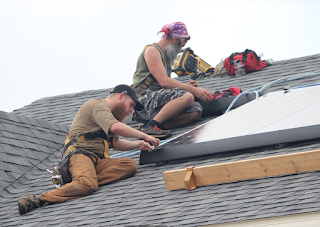
by jboullion | Oct 20, 2016 | Uncategorized
Today, the Public Service Commission of Wisconsin authorized
approximately $7.7 million in rebates spanning 2017 and 2018 to spur small,
customer-based renewable energy projects throughout Wisconsin.
The rebates go to residential, business, and non-profit
customers of eligible Wisconsin utilities, and enable the customers to install
renewable energy technologies including solar, geothermal, biogas, biomass and
small wind systems.
 |
| Full Spectrum Solar installs a solar PV system via the MadiSUN program |
|
Tyler Huebner, Executive Director of RENEW Wisconsin, said,
“From our renewable energy perspective, Chairperson Ellen Nowak may have said
it best in her concluding remarks, stating, ‘This is a great win for
Wisconsin.’ Indeed, continuing the highly successful renewable energy rebates
for 2017 and 2018 is a great win. This
level of renewable energy rebate funding should support upwards of 500 solar
electric home installations, 70 or more home geothermal installations, and
dozens of larger business renewable energy projects for each of the next two
years. The program will help our
residents save money and our companies stay cost-competitive.”
The Commission asked Staff to recommend how the renewables
funding should be split between residential and business projects, as well as a
review of the incentive levels in light of the fact that technology prices for
renewable energy systems, specifically solar electric systems, have been
dropping very quickly in recent years.
RENEW Wisconsin will provide our recommendations, and those of the
renewable energy industry, to Commission Staff in the coming days.
In addition, the Commission will evaluate spending $10-$20
million to expand biogas production from anaerobic digesters on dairy
farms. Staff and program administrators
will be developing biogas program options for the Commission to investigate
within 30 days, along with program options for increasing Focus on Energy’s
energy efficiency and renewable energy impacts in rural Wisconsin.
The Commission agreed to lower its cash reserve from $30
million down to $5 million, which freed up dollars carried over from previous
years to be put into programs starting in 2017.
Huebner said, “We applaud the Commission freeing up millions of dollars
of ratepayers’ money from previous years to be put into programs now that will
enable energy and dollar savings for customers across Wisconsin.
RENEW Wisconsin was the lead advocacy organization promoting
the continuation of the renewable energy rebates. We provided two separate memos describing the
history and status of the renewable energy industry and its relationship with
Focus on Energy and advocating for a continuation of rebates. In addition, a sign-on letter promoting
continuation of renewable energy rebates, which was supported by 41 businesses
and organizations from throughout Wisconsin, was delivered to the PSC as part
of the public comment period in this proceeding.
The PSC had authorized a renewable energy loan program in
2014 and allocated $10 million to it over four years. Today, approximately two years into the
program, the PSC decided to end the program and spend the remaining funds
instead on rebates, which had outperformed the loan program in that two year
period.
Biogas production through anaerobic digesters will also see
a boost. The PSC re-committed to
spending $6.4 million on this technology, which it had authorized in 2014. An initial plan to focus on smaller dairy
farms was not as effective as envisioned.
Today, the PSC authorized the creation of an interagency working group
to identify opportunities to expand this technology and its benefits of
renewable energy production, water quality improvements, and on-farm revenue
stability, and indicated that programs between $10 and $20 million should be
investigated to spur this technology.
In its comments to the PSC, RENEW pointed out that we have
world-class companies working in anaerobic digesters right here in Wisconsin
that can help make this program a success.








